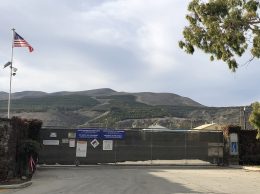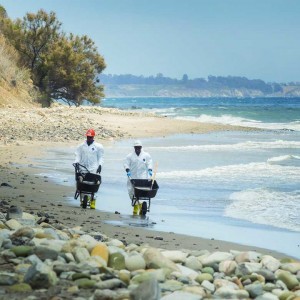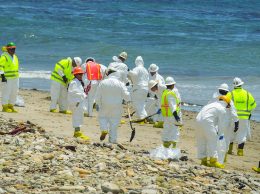Environmentalists sue regulators for not releasing info on tri-county oil pipelines
IN THIS ARTICLE
- Energy Topic
- pacbiztimes Author
By pacbiztimes Tuesday, December 8th, 2015
Environmental groups have filed lawsuits against federal regulators for allegedly refusing to release information regarding oil pipelines in the Tri-Counties.
The Environmental Defense Center and Santa Barbara Channelkeepers sent a Freedom of Information Act request to the Pipeline and Hazardous Materials Safety Administration on May 22.
PHMSA has yet to fulfill the FOIA requests, according to the complaint. PHMSA officials contacted by the Business Times on Dec. 8 declined to comment.
The nonprofits requested all records regarding the most recent internal inspection of Line 901, which was conducted in 2012, according to the filing. They also asked for details of all other inspections of Line 901 since 2013 such as maintenance data, monitoring information, incident reports and repair logs.
The heavily corroded Line 901 was responsible for the Refugio oil spill that fouled the Gaviota Coast. The pipeline leaked up to 142,800 gallons on May 19, according to owner Plains All American Pipeline, which initially underestimated the spill.
“The Plains pipeline spill at Refugio State Beach showed how little we know about the oil pipelines running under our beaches and parks, and through our communities,” EDC attorney Brian Segee said in a news release. “Our lawsuits are intended to help bring needed transparency regarding not only what went wrong at Line 901, but how we can avoid future disasters at other major regional pipelines in Santa Barbara and Ventura counties and those serving offshore oil platforms in the Santa Barbara Channel.”
PHMSA said on May 26 that it had a 63-request backlog and the average processing time was 54 workdays.
Sept. 1 was the last correspondence when someone from the agency asked for clarification, according to the complaint.
Agencies have 20 work days to comply or deny the FOIA request; they could have 30 days in certain circumstances.
The EDC also requested inspection data from M-143 and Tosco Oil pipelines that convey oil produced in Ventura County. M-143, which is owned by Crimson Pipeline, runs from Carpinteria to Ventura and Tosco runs from Ventura to Los Angeles. It asked for the oil spill response plans, incident reports and all other records.
The EDC filed a second lawsuit against the federal Bureau of Safety and Environmental Enforcement for allegedly not fulfilling a “voluminous” FOIA request, as described by BSEE. The amended request asked for all internal and external Outer Continental Shelf pipeline inspection reports from 2011. These pipelines transport water, natural gas, oil and other hazardous materials to and from the offshore oil platforms in the Santa Barbara Channel.
PHMSA proposed new regulations for pipeline oversight in October that would, in part, extend reporting requirements to all gathering lines, including rural lines and ones that transport oil through gravity that are currently exempt.
The proposals would require that all pipelines have a system for detecting leaks and establishing a 72-hour window for pipeline inspections following a storm or natural disaster.
The proposed regulations do not include a mandate for installing automatic shutoff valves. They are only required for newly constructed or entirely replaced pipelines. But PHMSA intends to move forward with a separate rule concerning automatic valve usage in the near future, a PHMSA representative told the Business Times.
Line 901 was not equipped with an automatic shutoff valve, unlike other lines in Santa Barbara County, because Plains successfully fought the mandate in court.
Line 901, and its connecting Line 903 that transports oil to refineries, were shut down following the spill and essentially cut off some of the region’s major oil producers, including ExxonMobil and Venoco.
Although SB 295, authored by Sen. Hannah-Beth Jackson, D-Santa Barbara, will require annual inspections for intrastate pipelines beginning in 2016, federal regulations, which govern the pipelines at issue in these lawsuits, are not as strict.
• Contact Alex Kacik at [email protected].
Related Articles
 Friday, October 14th, 2022
Friday, October 14th, 2022











